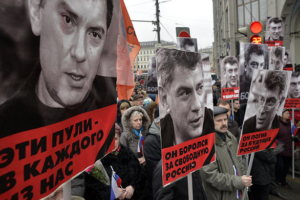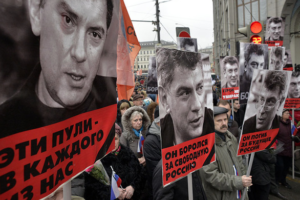 by J Michael Waller / Kyiv Post / Ukraine, April 7, 2015.
by J Michael Waller / Kyiv Post / Ukraine, April 7, 2015.
Ukraine has a secret weapon that it can deploy to defend itself against Russian aggression and subversion, and to deter further Russian hybrid hostilities against other countries. I discuss “Ukraine’s Secret Weapon” in a guest piece published April 7 in the Kyiv Post. Here’s the text:
Like no other country, non-aligned Ukraine has an untapped capability to defend itself against Russian aggression – with or without support from the West.
It’s an old idea that doesn’t require guns or bombs. All that it needs is the will to harness the aggressor’s internal vulnerabilities. While Russia is militarily far stronger than Ukraine, it shows signs of much greater weakness inside its borders.
Ukrainians know Russia’s political cultures, national fears and paranoias, socioeconomic divides, and other vulnerabilities that are ripe for adroit strategists to exploit.
By making war against Ukraine, Russian President Vladimir Putin has broken the surface tension that, so far, has held the Russian Federation together. In its own defense, Ukraine has the capability to attack the Putin regime’s internal power base.
This doesn’t mean fomenting horrible civil wars within the Russian state. To the contrary. It means showing solidarity with the peoples of Russia.
The assassination of top Putin opposition figure Boris Nemtsov outside the Kremlin, and the public outcry, shows that the time to act is now.
In its own special way, Ukraine can magnify the many voices inside Russia that, together, form the disorganized nucleus of a movement that could do to Putin what the Maidan movement did to the pro-Moscow regime in Kyiv one year ago.
Many ordinary Russians resent and fear the growing political repression and unchecked corruption under Putin’s mafiocracy. Some brave cruelty and imprisonment for brief acts of defiance. Censors are powerless to stop the viral spread of a popular protest video calling for a “Russian Maidan” movement against the Kremlin’s “totalitarian monster.”
Conditions are developing for a national anti-war movement. Russia’s ethnic minorities are aware of how their sons are singled out to serve as combat forces to fight Putin’s war against Ukraine. Recently, in the Siberian enclave of Tyva, a local former lawmaker called on the governmentsof all ethnically non-Russian regions of the Russian Federation to stop local recruitment for the war.
Ukraine should exploit this issue. No army can accomplish its objectives with a robust anti-war movement at home – especially when that movement is integrated with a global diplomatic offensive and aninfluence campaign directed at the combat troops themselves.
On the home front, Ukraine can reach out to those soldiers in their native languages. It can devise ways to help them rebel against their commanders, desert with dignity and safety to welcoming Ukrainians, and enjoy freedom and protection until they can return home.
If supporting a Russian Maidan and anti-war movement won’t result in Moscow recalling its forces, Ukraine has the ability to go much further.
Ukraine can become a platform for leaders and movements across Russia’s 11 time zones that are seeking autonomy – and even independence – from Moscow.
Some of those voices are ethnic Russians in the country’s far-flung cities and regions that suffer from economic and demographic collapse. Many realize that they would be better off with federalist-style autonomy.
That autonomy would threaten Putin’s control complex. It would allow rival political factions to flourish. It would require Moscow to cater to the regions’ deepening social demands by diverting cash from the central regime and its offensive weapons modernization, and back to the people.
Siberia has achieved significant autonomy, with the fearsome potential to cede more than half of Russia’s territory to Chinese influence and economic domination. For some Siberians, autonomy is not enough. They seek independence from Russia.
Within Siberia and the Russian Far East, movements grow along ethnic and regional lines, as Paul Goble chronicles in his “Window on Eurasia” blog. A Buryat Mongol independence movement around Irkutsk identifies heavily with neighboring Mongolia. In the Sakha Republic, a region almost as large as India in the Russian Far East, an awakening of the Yakut people has begun. Some Russian thought-leaders are urging European-style plebiscites, like those of Catalonia and Scotland, for independence.
In the Caucasus, ethnic Chechens and others have long sought autonomy or independence, and have already volunteered to help Ukraine. Some have given their lives. Many of these minority groups identify with one another, with Muslim Chechens aiding Orthodox Christian Georgians and vice-versa.
In Russian-occupied territory across the Black Sea, leaders of the Crimean Tatar nation are calling for Russia to leave their homeland and return it to Ukraine. Kaliningrad, the decaying Russian enclave between Poland and Lithuania whose legal status was never resolved after World War II, might well be settled by plebiscite.
All this human capital is Ukraine’s secret weapon to push back the invaders – while showing solidarity with ordinary citizens of the Russian Federation who, like Ukraine, suffer under Kremlin abuse.
The key is for Ukraine to serve as the sponsor, integrator, and magnifier of Russia’s voices for freedom and autonomy. That is Ukraine’s secret weapon.
